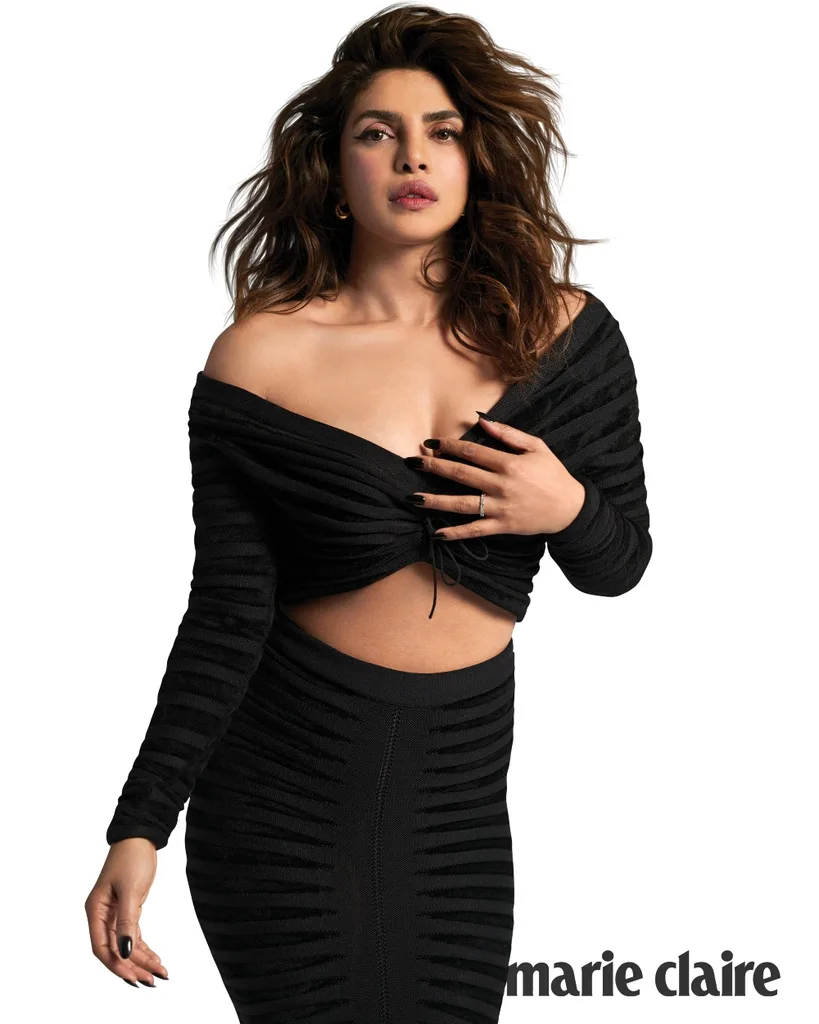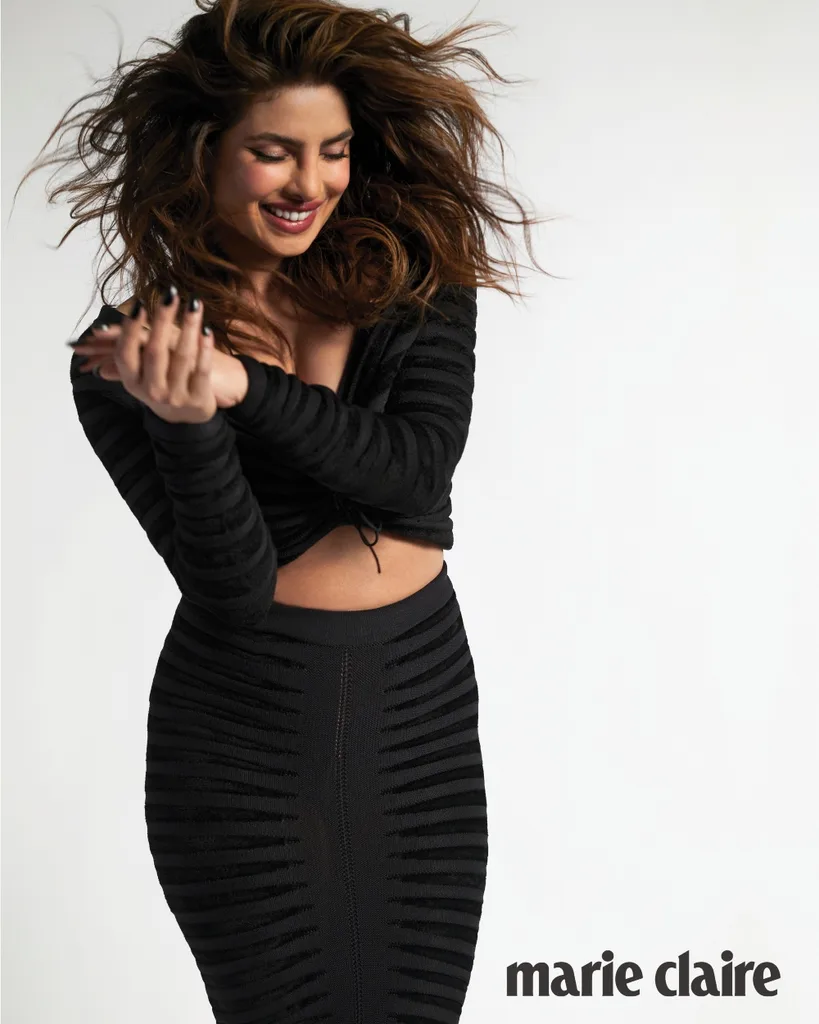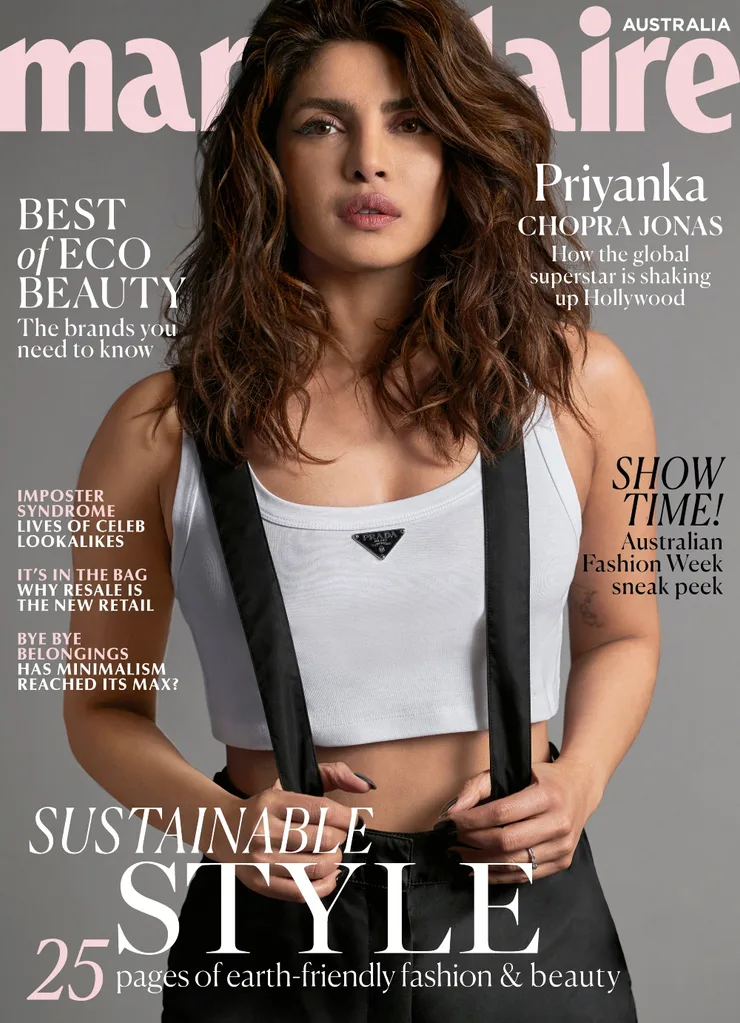When Priyanka Chopra Jonas speaks, you listen. Firstly, there’s her unmistakable voice: husky, deep, almost lyrical. Then there are her words. It may be a cliché to call Chopra Jonas worldly, but there’s no other way to put it. She’s a thinker. She’s smart. She doesn’t shy away from tough subjects. She wants to change the world.
This isn’t to say the 40-year-old doesn’t have a sense of humour. While introducing herself at the start of our marie claire interview, the actor laughingly says, “People think I’m serious but I can be pretty goofy. I grew up in India and the States. I have three dogs, one baby and a husband. What else? I’m not someone who likes dessert very much. That’s me.”
Of course, there’s more than that to Chopra Jonas. Born in Jharkhand in India, she moved to Iowa in the United States when she was nearly 13 to live with family. A few years later, she moved back to India and entered the Miss India pageant in 2000, which she won aged 18. At the Miss World pageant that same year, she once again reigned supreme. Several starring roles in Hindi films followed, earning her critical acclaim for her acting.
In 2011, she moved back to the US, and by 2015 had landed the part of Alex Parrish in the TV series Quantico. The role made Chopra Jonas the first South Asian to head up an American network drama series and cemented her as a force to be reckoned with.
Her personal life flourished too. She met musician and fellow actor Nick Jonas after he famously slipped into her DMs in May 2018 and, after falling head over heels in love, Jonas popped the question two months later. They wed in December that year in a lavish and elaborate Hindi wedding held over a number of days. The couple are now parents to daughter Malti Marie, who was born via surrogate in January 2022.
Here, Chopra Jonas reflects on finally achieving pay parity with her male co-stars, why diversity goes beyond who you see on-screen, and the moment she knew she had met the One.

Marie Claire: Did you have many women tell you how much it meant to them to see you cast as the first South Asian to lead a US drama series in Quantico?
Priyanka Chopra Jonas: Definitely. It was actually a really strange experience for me. When I went to school in India, I didn’t understand the need for that kind of diversity because I watched Indian entertainment and everyone looked like me, you know? Yes, there was an equity on lighter skin when it comes to beauty, but people were all brown. I started consuming international entertainment while I lived in India.
Then I moved to America and I remember watching TV and the only Indian was Apu [from sitcom The Simpsons]. In American entertainment, there were very few Indian talents that you ever saw. Whenever there were, they were checking the box or you never saw them as leads. There was always a thing of feeling like the “other” when I went to high school in the States.
And then when I did Quantico, I had young people, not just girls, but immigrants – people who had travelled across the border from different countries seeking work in different fields – having a visceral reaction to me being cast in the show. We don’t just have to be the stereotypical parts. We can be commercial, mainstream entertainment leads of commercial, mainstream entertainment. That became a thing I really went after.
MC: But it doesn’t feel like we’ve moved the dial on body diversity. You recently spoke up after someone said you weren’t a “sample size”.
PCJ: There is a very skewed nature when it comes to the standard of beauty for women. There’s an unrealistic expectation of how women should look and behave, and that is entrenched in culture. That’s the long distance that we have to walk. Unless the culture of it changes, unless the conversation of it changes, we’re not gonna see big change.
When we talk about inclusion now, you see fashion houses including models that look different – different sizes, different ethnicities – and we need to extend that from the runway into how we talk about women, how we cast women, how we see women, and what beauty looks like to us. I’m so happy that that’s a conversation and a debate now.

MC: Speaking of inclusivity, in March we saw Michelle Yeoh and Ke Huy Quan win Oscars for a film that was uniquely Asian-American. The song “Naatu Naatu” from Tamil film RRR won best original song too. We are seeing change but you’ve also said that “diversity is about how you sound – the words that come out of your mouth, the language that you use.” In other words, diversity isn’t just about what you see, it’s what you hear.
PCJ: I’m of the generation of actors that has travelled across continents and worked across continents. The hurdle always was, “Oh, this is subtitled so I don’t know how many people are going to come out and watch it outside of the diaspora that knows Hindi language.”
When I began seeking work in America and English-language entertainment, pushing that boundary was very important to me. When I started 10 years ago, it was rare to see diverse people on our screens speaking the language that they truly speak in … [Movies were set in] India or China but people spoke English because diversity was wanted, but at the same time not complete diversity. That was 10 years ago, so it’s cool to be able to see how much things have changed. I think we’ve finally reached an incredible time where entertainment is entertainment. It has no borders. It has no language.

MC: Your new Prime Video series Citadel is the start of a global franchise that will produce shows in several countries with local stars in local languages. Was that what attracted you to it?
PCJ: I think what is really unique about Citadel is nothing like this has ever been attempted before. It’s a show that travels around the world, is shot by people of those countries and made up of people of those countries. I’m very excited to see this cross-pollination happen. And the show is just so fun. Citadel as a concept is an intelligence agency that has loyalty to no nation. It is loyal to humanity. That concept is so inviting to me and brings the world together.
MC: In your 22-year career, it is only with Citadel that you’ve achieved pay parity with your male co-star.
PCJ: I’m sure in your field it happens too, right? With male and female journalists?
MC: All the time.

PJC: If your contribution, time and what you bring to the table is the same as your male counterpart, there is a very serious conversation to be had about compensation. It was not a conversation I was encouraged to have for a very long time because it was just a given when I started out in movies that your male counterpart would have a substantially larger pay cheque.
I think my generation of female actors really stood up for themselves. In India my co-actors, whether it was Kareena Kapoor, Deepika Padukone or Katrina Kaif, a lot of these girls really pushed the envelope – along with me – to have that conversation. And I saw that in the West as well, with Mindy Kaling saying, “All right, if you’re not gonna cast me, I’m just gonna write myself a show with myself as the lead.” And Reese Witherspoon, Kerry Washington, Nicole Kidman banded together as producers, creating roles for themselves, creating content that cast them in the parts that they wanted versus being a sidekick to the male actor.
It is such a wonderful time to be working in a male-dominated industry but having women in front and behind the camera standing up for each other. So when you talk about parity, I have to give credit to [Prime Video] studio head Jennifer Salke, being a woman. This topic wasn’t as much of a debate as it would have been five years ago for me.
Pick up a copy of the May issue of marie claire Australia on sale Thursday 20th April to read the full story!











